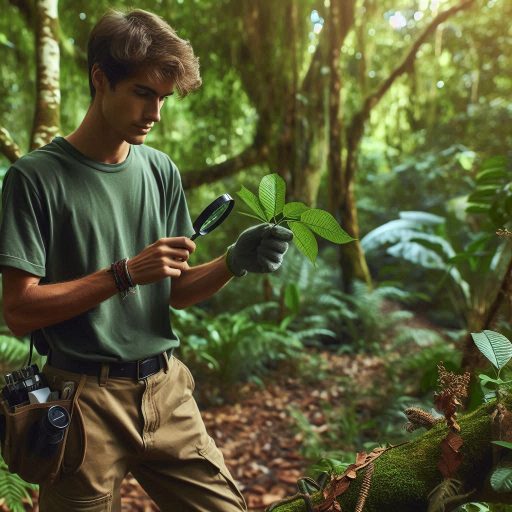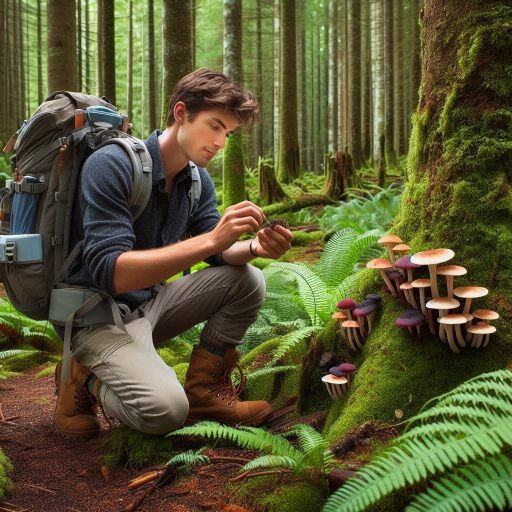Introduction
Ecology is the study of interactions between organisms and their environments.
It explores how living beings coexist and affect one another.
Understanding these interactions is vital for addressing environmental challenges.
Specialization within the field of ecology enhances our understanding of specific ecological processes.
Specialized knowledge allows ecologists to tackle complex issues like climate change and habitat loss.
It fosters innovation in conservation practices and informs policy decisions.
This blog will discuss several popular specializations in ecology.
We will explore evolutionary ecology, which examines how species adapt over time.
Conservation biology focuses on protecting biodiversity and managing natural resources effectively.
Ecosystem ecology investigates the interactions between living organisms and their physical environments.
Each of these specializations plays a crucial role in promoting sustainability and ecosystem health.
By understanding these specializations, aspiring ecologists can find their passion and contribute meaningfully to conservation efforts.
Emphasizing specialization equips future ecologists to address the pressing environmental challenges we face today.
Together, we can foster a healthier planet for all living beings.
Conservation Biology
Definition and Scope
Conservation biology is a branch of ecology that focuses on preserving biological diversity.
It examines the relationships between species, their habitats, and the ecosystem.
Conservation biology seeks to understand how human activities impact these relationships.
The field combines various disciplines, including genetics, ecology, and environmental science.
This interdisciplinary approach allows for a comprehensive understanding of biodiversity issues.
Importance of Conservation Biology in Maintaining Biodiversity
Conservation biology plays a crucial role in maintaining biodiversity.
Biodiversity refers to the variety of life on Earth.
Healthy ecosystems depend on diverse species for stability and resilience.
Loss of biodiversity can lead to ecosystem collapse and increased vulnerability to climate change.
Conservation biology helps identify threatened and endangered species.
It aims to develop strategies to protect these species from extinction.
Additionally, conservation biology addresses habitat destruction, pollution, and invasive species.
These factors significantly threaten ecosystems worldwide.
By studying these impacts, conservation biologists can create effective management plans.
Such plans help restore and maintain habitats for various species.
Furthermore, conservation biology emphasizes the importance of ecosystem services.
Healthy ecosystems provide clean air, water, and food, benefiting human populations.
Examples of Conservation Biology Projects and Their Impact
Several successful conservation biology projects illustrate the field’s importance.
One notable example is the recovery of the California condor.
This species faced extinction due to habitat loss and lead poisoning.
Conservation biologists implemented captive breeding programs.
They also conducted habitat restoration efforts.
As a result, the population of California condors has increased significantly.
Another impactful project involves the restoration of the Florida Everglades.
This unique ecosystem suffered from drainage and pollution.
Conservation biologists developed plans to restore natural water flow.
Their efforts led to improved water quality and increased biodiversity.
Species such as the American crocodile and various fish populations are now thriving.
Additionally, the “Red List” developed by the International Union for Conservation of Nature (IUCN) plays a vital role.
This list categorizes species based on their conservation status.
It raises awareness about endangered species and encourages global conservation efforts.
Governments and organizations use the Red List to prioritize conservation actions.
By identifying species at risk, conservation biology helps allocate resources effectively.
Community-based conservation projects also showcase the importance of local involvement.
These projects engage communities in protecting their natural resources.
Local knowledge enhances conservation efforts and fosters sustainable practices.
For example, community-led reforestation initiatives can restore habitats while providing economic benefits.
Conservation biology is essential for maintaining biodiversity.
It highlights the interdependence of species and their habitats.
Through various projects and initiatives, conservation biology actively works to protect the planet’s biodiversity for future generations.
These efforts demonstrate that preserving our natural world is crucial for the health of ecosystems and humanity.
Read: How to Become a Licensed Chemist in the USA: Steps and Tips
Wildlife Ecology
Definition of Wildlife Ecology
Wildlife ecology is the study of animal populations in their natural habitats.
It examines the relationships between species and their environments.
Wildlife ecologists analyze how these interactions affect ecosystem health.
They focus on the behaviors, distributions, and populations of wildlife species.
Their work helps understand the complex dynamics of ecosystems.
Role of Wildlife Ecologists
Wildlife ecologists play a crucial role in studying and managing wildlife populations.
They conduct field research to gather data on species.
This data informs conservation strategies and wildlife management practices.
Ecologists monitor population trends to identify species at risk.
By understanding population dynamics, they develop effective management plans.
Wildlife ecologists also assess habitat conditions to ensure species survival.
They evaluate environmental factors such as food availability and shelter.
Their insights guide habitat restoration efforts and land-use planning.
Ecologists collaborate with government agencies and non-profit organizations.
Together, they implement policies to protect endangered species and their habitats.
Education and outreach are essential components of wildlife ecology.
Wildlife ecologists educate the public about the importance of conservation.
They engage communities in wildlife protection initiatives.
By fostering a connection between people and nature, they promote sustainable practices.
Case Studies of Successful Wildlife Ecology Programs
Several successful wildlife ecology programs demonstrate the impact of this field.
One notable case is the recovery of the American bald eagle.
In the 1970s, this majestic bird faced near extinction due to habitat loss and pesticide use.
Wildlife ecologists studied its population decline and implemented protective measures.
They banned harmful pesticides and established nesting areas.
As a result, bald eagle populations rebounded dramatically.
Another success story involves the reintroduction of gray wolves in Yellowstone National Park.
Wildlife ecologists conducted extensive research on the ecosystem’s health.
They identified the absence of wolves as a critical issue affecting biodiversity.
In 1995, they initiated a reintroduction program.
This effort restored the ecological balance in the park.
Wolves helped regulate elk populations, allowing vegetation to recover.
The result was a healthier, more diverse ecosystem.
The Florida panther recovery program also showcases the effectiveness of wildlife ecology.
By tracking panther populations, ecologists identified genetic issues due to inbreeding.
They introduced a new population from Texas to increase genetic diversity.
This intervention led to population growth and improved health.
Today, the Florida panther is on the path to recovery.
These case studies highlight the importance of wildlife ecology.
They demonstrate how scientific research leads to successful conservation efforts.
Wildlife ecologists contribute significantly to protecting endangered species.
Their work ensures a balanced and thriving ecosystem for future generations.
By studying wildlife populations, they safeguard our planet‘s biodiversity.
Their ongoing research is vital to maintaining healthy ecosystems worldwide.
Read: Biology Ethics: Navigating Complex Issues in the US
Marine Ecology
Overview of Marine Ecology and Its Significance
Marine ecology studies ocean ecosystems, their organisms, and interactions.
It focuses on diverse environments, including coral reefs, coastal areas, and open oceans.
Understanding these ecosystems is crucial for conserving marine life and maintaining biodiversity.
Marine ecology helps us comprehend how human activities affect oceans.
It informs policies for sustainable fisheries and marine protected areas.
This field plays a vital role in addressing climate change effects on marine habitats.
Marine ecologists analyze food webs and nutrient cycles to understand ecosystem health.
Their work provides insights into species adaptation and resilience.
Overall, marine ecology contributes to global conservation efforts and the sustainability of marine resources.
Challenges Faced by Marine Ecologists in Studying Ocean Ecosystems
Studying ocean ecosystems presents unique challenges.
The vastness and depth of oceans make research difficult and costly.
Limited accessibility to remote areas hampers data collection.
Additionally, the dynamic nature of marine environments complicates long-term studies.
Marine ecologists often face unpredictable weather and rough sea conditions.
These factors can hinder research expeditions and data accuracy.
Furthermore, underwater visibility can be poor, affecting observational studies.
The diversity of marine species also creates identification challenges.
Many organisms remain undiscovered or poorly understood.
Another significant challenge is the impact of climate change.
Rising temperatures and ocean acidification threaten marine ecosystems.
These changes can alter species distributions and disrupt food webs.
Marine ecologists must adapt their methods to account for these shifts.
Pollution also poses a serious risk to ocean health.
Plastics, chemicals, and oil spills contaminate marine habitats.
This pollution can harm wildlife and degrade ecosystems.
Examples of Marine Ecology Research and Its Impact on Conservation Efforts
Marine ecology research has led to significant conservation efforts worldwide.
One example is the study of coral reef ecosystems.
Researchers have identified key stressors impacting reef health, such as warming waters and nutrient runoff.
This knowledge has informed initiatives to reduce pollution and protect reef areas.
Another notable research area involves tracking migratory species, like sea turtles and sharks.
Studies on their movements help establish marine protected areas, ensuring safe habitats.
The use of satellite tracking has enhanced our understanding of migration patterns.
Additionally, research on fisheries management has improved sustainability.
Marine ecologists assess fish populations and their habitats, informing catch limits and conservation strategies.
Their findings help balance ecological health with community needs.
Finally, the study of invasive species provides valuable insights into ecosystem dynamics.
By understanding their impact, marine ecologists develop management plans to mitigate their effects.
Marine ecology is essential for understanding and protecting ocean ecosystems.
Despite facing numerous challenges, the work of marine ecologists significantly impacts conservation efforts.
Their research fosters sustainable practices and promotes biodiversity.
Read: Continuous Learning: Post-graduate Options for US Biologists

Restoration Ecology
What is Restoration Ecology?
Restoration ecology focuses on returning ecosystems to their original state after disturbances.
This specialization involves understanding ecological processes and applying this knowledge to restore habitats.
Restoration ecologists work on diverse projects, from wetlands to forests and grasslands.
They collaborate with landowners, government agencies, and community groups.
Their goal is to improve ecological integrity and enhance biodiversity.
Importance of Restoring Ecosystems
Restoring ecosystems is vital for numerous reasons.
First, it helps maintain biodiversity.
Diverse ecosystems support various species, contributing to ecological resilience.
Biodiversity also ensures the stability of ecosystems in the face of environmental changes.
When species are lost, entire food webs can collapse, leading to further degradation.
Second, restored ecosystems provide essential ecosystem services.
These services include clean air, clean water, and climate regulation.
Healthy ecosystems can also mitigate natural disasters, such as floods and landslides.
They can improve soil fertility and increase agricultural productivity.
By restoring ecosystems, we can enhance these vital services that benefit humans and wildlife alike.
Successful Case Studies in Restoration Ecology
Successful case studies highlight the impact of restoration ecology.
One such example is the restoration of the Everglades in Florida.
This project aimed to improve water flow and restore native vegetation.
Restoration efforts involved removing invasive species and reconnecting waterways.
The project has seen significant progress, increasing biodiversity and improving water quality.
The Everglades now support a wide range of wildlife, including endangered species.
Another noteworthy case is the Pioneer Valley in Massachusetts.
This area experienced significant habitat loss due to urban development and agriculture.
Restoration ecologists worked to restore wetlands and grasslands.
They engaged local communities in replanting native species and removing invasives.
As a result, the area has seen a resurgence of wildlife, including migratory birds.
This project has strengthened community ties and raised awareness of the importance of biodiversity.
In New Zealand, restoration ecology focuses on its unique flora and fauna.
Invasive species threaten native ecosystems, so ecologists have initiated numerous projects.
They work to eradicate pests and reintroduce native species.
One successful example is the restoration of the Kaik?ura Peninsula.
This project involved habitat restoration for endangered seabirds.
The collaborative efforts have improved populations and fostered community engagement.
Restoration ecology plays a crucial role in maintaining biodiversity and ecosystem services.
This specialization addresses pressing environmental challenges.
Successful projects demonstrate the positive outcomes of restoration efforts.
By engaging communities and focusing on ecological integrity, restoration ecologists create a brighter future for ecosystems.
Their work is vital for sustaining the planet’s biodiversity and supporting human well-being.
With ongoing efforts, we can restore our natural world for generations to come.
Read: US Chemistry Conferences and Symposiums to Attend in 2024
Urban Ecology
Definition of Urban Ecology and Its Relevance
Urban ecology examines the relationships between living organisms and their urban environments.
It studies how ecosystems function within cities.
This field explores the interactions between humans, flora, and fauna.
Urban ecology plays a critical role in understanding how urbanization affects biodiversity.
Rapid urbanization alters natural habitats, leading to environmental challenges.
By focusing on these changes, urban ecologists provide insights into sustainable practices.
Their work helps design greener, healthier cities.
Urban ecology connects ecological principles with urban planning.
This approach fosters resilience in urban ecosystems, ensuring they can withstand various pressures.
Role of Urban Ecologists in Designing Sustainable Urban Environments
Urban ecologists contribute significantly to creating sustainable urban environments.
They assess the impact of urban development on local ecosystems.
By evaluating species diversity, they identify critical areas for conservation.
Urban ecologists develop strategies to integrate nature into urban landscapes.
Their efforts promote green infrastructure, such as parks and green roofs.
These features enhance urban biodiversity and improve residents’ quality of life.
Urban ecologists collaborate with city planners, architects, and policymakers.
They advocate for sustainable practices that mitigate environmental degradation.
Their research informs policies that prioritize ecological health in urban design.
Examples of Urban Ecology Research and Its Impact
Urban ecology research has led to transformative changes in urban planning.
For instance, studies on urban heat islands reveal how cities trap heat.
This knowledge drives initiatives to increase vegetation cover in cities.
Green roofs and urban forests help mitigate heat effects.
Another example is research on pollinator populations in urban areas.
Urban ecologists found that native plants attract more pollinators.
This finding encourages cities to incorporate native vegetation into landscaping.
Additionally, studies on water management highlight the importance of permeable surfaces.
Implementing these surfaces reduces urban runoff and enhances groundwater recharge.
Cities worldwide benefit from urban ecology research.
In Chicago, urban ecologists designed a plan to restore biodiversity in city parks.
This initiative increased native species and improved residents’ connection to nature.
In Singapore, research led to the development of a city-wide green plan.
This plan integrates green spaces into urban infrastructure, enhancing ecological resilience.
Similarly, in New York City, urban ecology studies influenced the design of the High Line.
This elevated park transformed a former railway into a vibrant green space.
It provides essential habitat for urban wildlife and promotes community engagement.
Transform Your Career Today
Unlock a personalized career strategy that drives real results. Get tailored advice and a roadmap designed just for you.
Start NowUrban ecology serves as a vital field that addresses the complexities of urbanization.
It connects ecology with urban planning, fostering sustainable practices.
The work of urban ecologists significantly impacts city design, promoting greener environments.
Their research enhances our understanding of urban ecosystems and drives meaningful change.
By integrating ecological principles into urban planning, we can create healthier, more sustainable cities for future generations.
You Might Also Like: Fieldwork vs. Laboratory: Soil Scientist’s Work
Evolutionary Ecology
Definition and Scope of Evolutionary Ecology
Evolutionary ecology studies the interactions between evolutionary processes and ecological dynamics.
It examines how species evolve in response to their environments.
This field integrates concepts from both ecology and evolutionary biology.
Researchers explore how natural selection shapes species behavior, morphology, and life histories.
They analyze adaptations that arise from ecological pressures.
Evolutionary ecology also investigates how these adaptations affect community structure and dynamics.
The scope of this discipline includes various scales, from individual organisms to entire ecosystems.
It encompasses both biotic and abiotic factors influencing evolutionary changes.
Evolutionary ecologists often utilize mathematical models and empirical research to analyze data.
Their findings contribute significantly to understanding biodiversity and ecosystem function.
Importance of Understanding Evolutionary Processes in Ecological Systems
Grasping evolutionary processes is crucial for several reasons.
First, it helps explain species distributions and interactions within ecosystems.
Understanding these processes reveals how species adapt to changing environments.
This knowledge is vital in predicting species responses to climate change and habitat loss.
Moreover, it sheds light on the dynamics of invasive species.
By studying evolutionary ecology, we gain insights into the resilience of ecosystems.
This understanding aids in developing effective conservation strategies.
Evolutionary processes also play a role in maintaining genetic diversity.
Genetic diversity is essential for species survival and ecosystem stability.
Thus, evolutionary ecology provides the foundation for sustainable management practices.
Case Studies Highlighting the Role of Evolutionary Ecology in Conservation and Ecosystem Management
Numerous case studies illustrate the significance of evolutionary ecology in real-world scenarios.
One prominent example involves the conservation of the peppered moth in England.
Researchers observed a shift in coloration due to industrial pollution.
Darker moths had a selective advantage in polluted areas, demonstrating natural selection in action.
This case highlights the impact of human activity on evolutionary processes.
Another example involves the reintroduction of wolves to Yellowstone National Park.
The wolves‘ presence affected the population dynamics of deer and other species.
This interaction resulted in a cascade of ecological changes.
These changes included vegetation recovery and increased biodiversity.
Understanding the evolutionary dynamics of these interactions helped inform management decisions.
Additionally, studies on coral reefs showcase the role of evolutionary ecology in conservation.
As ocean temperatures rise, some coral species exhibit resilience through adaptive traits.
Researchers study these traits to identify conservation priorities.
By focusing on resilient coral populations, they enhance reef restoration efforts.
Evolutionary ecology is a vital specialization within ecology.
It connects evolutionary processes with ecological outcomes.
Understanding these connections informs conservation efforts and ecosystem management strategies.
This knowledge enhances our ability to protect biodiversity and maintain ecosystem health.
Embracing evolutionary ecology ultimately leads to more effective environmental stewardship.
You Might Also Like: Botanical Science: Current Trends and Future Directions
Conclusion
In this blog, we discussed popular specializations within ecology, such as evolutionary ecology, conservation biology, and ecosystem ecology.
Each specialization offers unique insights into complex relationships within ecosystems.
Understanding these areas is crucial for addressing ecological challenges like climate change, habitat loss, and biodiversity decline.
Specializations enable ecologists to develop targeted solutions for pressing issues.
They enhance our ability to implement effective conservation strategies.
By focusing on specific ecological fields, scientists drive impactful research and inform policy decisions.
Aspiring ecologists should explore these specializations to unlock diverse career opportunities.
Engaging with fields such as evolutionary ecology or conservation biology leads to meaningful contributions in conservation efforts.
These specializations are essential for promoting biodiversity and ecosystem health.
In general, specialization within ecology enriches our understanding of nature and equips ecologists to tackle complex environmental issues.
I encourage future ecologists to pursue their interests in these fields.
Exploring these specializations can foster personal growth and contribute to global conservation efforts.
Together, we can create a sustainable future for our planet and its inhabitants.




